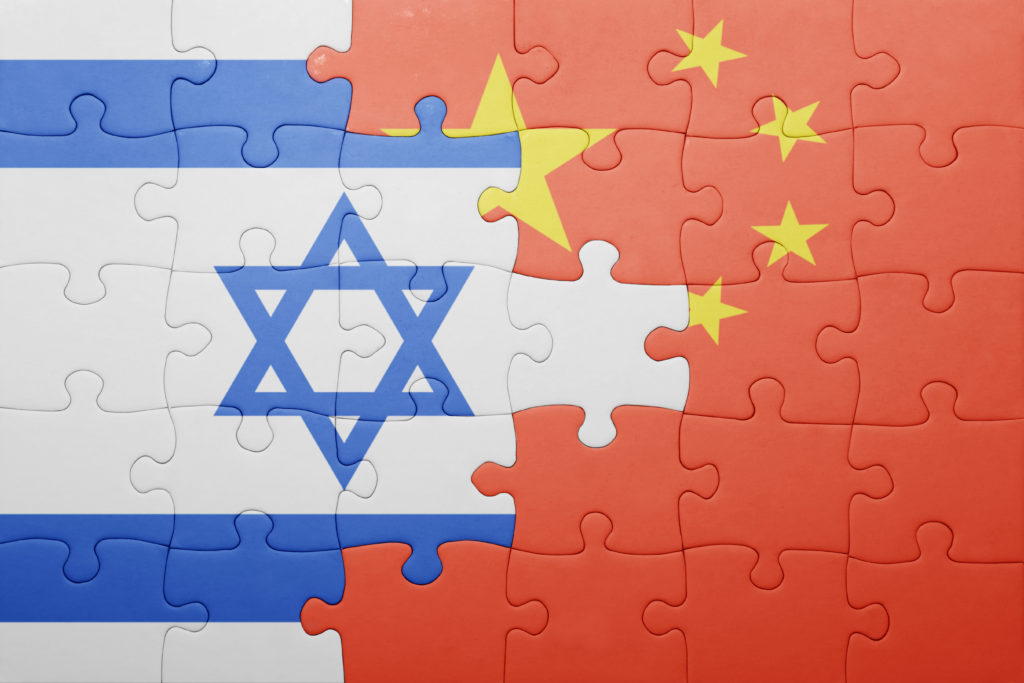Australia/Israel Review
Asia Watch: Balancing Act
Mar 9, 2021 | Michael Shannon

Israel is but one among many middle power countries placed in a bind by the emergent superpower rivalry between China and the United States, trying to balance its burgeoning economic relationship with the former and its security and diplomatic ties with the latter.
Relations between Israel and China are currently the widest-reaching since diplomatic normalisation in 1992, with China now Israel’s second-largest trading partner. Since China emerged as the world’s second-largest economy in 2010, advanced technology has been the national priority in its 12th Five Year Plan and it has turned to the ‘Start-up Nation’ for innovative solutions to its domestic needs.
Since then, bilateral trade between Israel and China has doubled, with US$11.53 billion in Chinese capital flowing into Israeli tech firms and infrastructure contracts. Meanwhile, the latest figures show Israeli exports to China amounted to US$548.5 million in January 2021, compared to US$355.4 million dollars in the same month last year.
But the growing relationship has caused growing unease in Washington. Last year, then-US Secretary of State Mike Pompeo called on Israeli officials to cease Chinese investments and partnerships in the country, claiming that it put “Israeli citizens at risk” and compromised intelligence sharing, communications and security issues between the US and Israel.
Of foremost concern is China’s investment in Israel’s Port of Haifa. In June 2019, despite US pressure on Israel, Chinese company Shanghai International Port Group (SIPG) secured a 25-year contract to build and operate a large commercial shipping port on the Mediterranean, set to begin operations in 2021. Israel recouped US$290m in the deal.
US authorities have expressed concerns that the Chinese company would be operating adjacent to an Israeli naval base where ships of the US Sixth Fleet frequently dock and could potentially collect intelligence. The US has cautioned that its Navy might no longer use the base if the Chinese state-owned company takes over management of the port. The naval base reportedly also houses Israeli nuclear weapons-capable submarines.
Israel is taking heed of these warnings to some degree, recently denying a Hong Kong firm’s investment bid worth US$1.5bn to build Israel’s Sorek B desalination plant, in favour of the Tel Aviv-based IDE Technologies. Israel also established a foreign investment oversight committee in 2019, and after an independent review by Israel’s Ministry of Defence and consultations with Washington, Jerusalem is expected to exclude Chinese companies from tendering to build Israel’s 5G infrastructure.
Now a Washington think tank, the Jewish Institute for National Security of America (JINSA), has weighed in, arguing in a new report that China’s involvement in Israel could undermine the US-Israel strategic relationship, and calling for the US to assist Israel in protecting itself against Chinese exploitation, including elevated intelligence-sharing and expanded US investment in Israel’s infrastructure and technology sectors.
JINSA’s report, titled “Curtailing Chinese Investment in Israel: A Comprehensive and Cooperative US-Israeli Strategy,” expresses strong concern over the Haifa port deal, and that “Israel could find itself outside of trusted US military, financial, commercial, and technological networks, unless it acts decisively” to limit Chinese investments in the country.
The pro-Israel think tank argues that China is aiming to fuel and expand its own military and industrial influence by buying and investing in Israeli technology. “Beijing’s strategy seeks to turn economic power into geopolitical dominance and civilian technology into a military advantage,” the report added.
Finally, the report advocates that the United States and Israel sign a new bilateral investment treaty and update the US-Israel Free Trade Agreement.
Another perspective recently appeared in Israel’s Haaretz newspaper, where Gedaliah Afterman and Theresa Hoffmann of the Abba Eban Institute for International Diplomacy at the Interdisciplinary Center in Herzliya noted that China “has substantially expanded its engagement in the Middle East in ways that are already altering it,” positioning itself as the largest investor in the Middle East and the largest trading partner of the Arab League.
“Israel simply can no longer think about the Middle East without thinking about China. It has no substitute for the United States – certainly not on the defence and diplomacy fronts, but China’s growing importance on other fronts is already a reality,” they argue.
“A clear strategy and comprehensive policies vis-à-vis China, signalling reassurance to the US that its concerns are addressed while reflecting a longer-term approach towards the Middle Kingdom, will lower risks of strategic mistakes with both Washington and Beijing – mistakes that Israel, dependent on both, cannot afford.”






